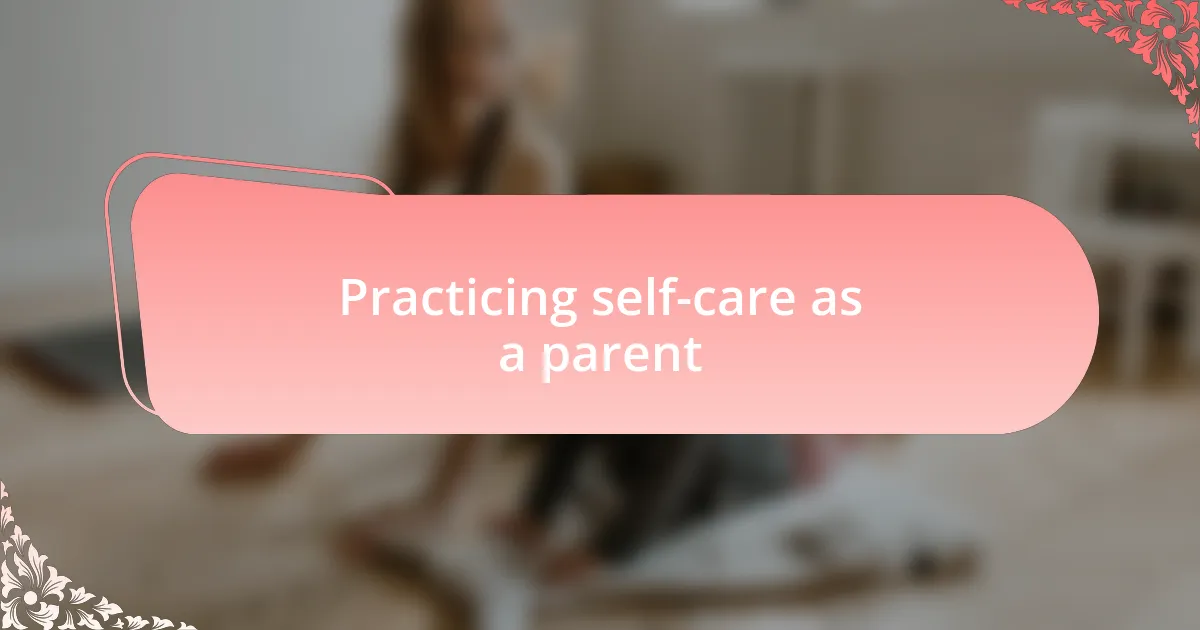Key takeaways:
- Understanding child mental health is essential for emotional resilience and fostering open communication about feelings.
- Creating a supportive home environment through routines, emotional validation, and connection promotes children’s mental well-being.
- Encouraging open communication and practicing self-care as a parent are crucial for nurturing both the parent’s and child’s emotional health.

Understanding child mental health
Understanding child mental health is crucial for fostering resilience and emotional well-being. I remember a time when my child seemed withdrawn, and I questioned whether it was just a phase or something more significant. Noticing changes in a child’s behavior can be alarming, and I often wonder how many parents overlook these signs, thinking it’s just typical childhood ups and downs.
Emotional development in children often shapes their mental health, influencing how they relate to others and cope with stress. I’ve often reflected on my own childhood experiences, recalling how I managed emotions in difficult situations. Seeing those moments mirrored in my own children reminds me that open conversations about feelings are vital. Aren’t we all looking for a space where we can express ourselves freely without judgment?
Understanding the intricacies of child mental health means recognizing that it’s not about being perfect; it’s about being present. I still remember a moment when I simply sat with my child, allowing them to express fears about school. That moment of connection not only eased their anxiety but also deepened our bond. By nurturing these conversations, we lay the foundation for a lifetime of healthy emotional expression.

Importance of mental health support
The importance of mental health support cannot be overstated, especially in a child’s formative years. I remember a time when my child faced challenges with social interactions, and I realized that providing a supportive environment was critical. Just as I wouldn’t ignore a physical ailment, I now understand the necessity of addressing emotional struggles head-on.
Mental health support serves as a buffer against the stressors that children encounter daily. There was a moment when my child faced anxiety during exam season, and offering reassurance and listening to their fears changed everything. It made me think—how often do we overlook the power of just being there for our kids, allowing them to articulate their worries?
Creating a supportive atmosphere at home fosters resilience that lasts a lifetime. I’ve watched as open discussions about emotions have empowered my children to navigate life’s ups and downs more effectively. Isn’t it reassuring to know that by simply prioritizing mental health, we equip our children with tools that help them thrive not only as kids but as adults?

Creating a supportive home environment
Creating a supportive home environment is essential for nurturing a child’s mental health. I’ve found that designating a cozy corner in our home for quiet time has made a big difference. Whether it’s reading together or simply sitting in silence, that space allows my kids to unwind and express their feelings without pressure. Have you ever observed how a simple change in surroundings can impact a child’s mood?
Additionally, I believe that open communication is the cornerstone of a supportive home. I always make it a point to check in with my kids about their day, ensuring they know they can talk about anything—good or bad. There was one evening when my daughter opened up about feeling left out at school, and we were able to brainstorm ways to cope together. I cherish those moments because they not only strengthen our bond but also empower her to face challenges head-on.
Finally, fostering a sense of belonging is equally important. I incorporate family activities that everyone enjoys, whether it’s game night or cooking together. I’ve noticed my children thrive when they feel connected, and it reminds me to appreciate the little moments that build a strong family foundation. Isn’t it incredible how such simple practices can create a nurturing home environment?

Establishing routines for stability
Establishing routines can bring a sense of stability that kids often crave. I remember when we adopted a consistent bedtime routine—reading a story and discussing the day’s highlights—my children began to feel a sense of security. How reassuring is it to know that these small rituals can significantly impact their peace of mind?
In my experience, daily schedules aren’t just about time management; they’re about creating predictability. For instance, when we have set times for meals and homework, it helps reduce anxiety around transitions. I can see the relief on my kids’ faces when they know what to expect. It makes me wonder how much easier their emotional landscape would be with a little routine to anchor them?
Moreover, I’ve realized that not all routines need to be rigid. Flexibility within our daily practices allows for those spontaneous moments that bring joy. Last weekend, we decided to have an impromptu picnic in the living room instead of our usual Saturday plans. Those afternoons, filled with laughter and unexpected fun, are precious memories that remind me routines don’t have to be constraining; they can create space for cherished moments too.

Techniques for promoting emotional wellness
Finding avenues for expression is key to promoting emotional wellness. When my child first showed anxiety about school, we turned to art as a way to communicate feelings. It was extraordinary to see how colors and shapes could speak volumes; through drawing, we uncovered emotions that were hard to articulate. Have you ever noticed how creative outlets can transform anxiety into something tangible and manageable?
Incorporating mindfulness practices into our routine has been another transformative step. I vividly remember a moment when we tried breathing exercises together after a stressful day. Taking those few minutes to focus on our breath not only calmed my child but also grounded me. How often do we rush through our days without pausing to reconnect with ourselves? Those quiet moments can be powerful catalysts for emotional clarity.
Lastly, fostering connections is crucial for emotional wellness. Game nights at home have become a cherished ritual for us. I notice how laughter and teamwork during these games not only strengthen our bond but also provide a safe space to express frustrations and joys. Isn’t it interesting how shared experiences can serve as emotional safe havens? Each board game draws us closer, weaving a fabric of resilience and support in our family.

Encouraging open communication
Creating an environment where open communication thrives takes intention and practice. I’ve found that setting aside time, like during dinner, to check in on each other’s day can yield surprisingly profound conversations. One evening, my child opened up about feeling left out at recess, and I realized how vital it is to create a space where feelings are shared freely. Have you considered the value of simply asking how someone’s day went?
Another effective method I’ve discovered is validating emotions as they arise. When my child expressed frustration over homework, instead of brushing it off, I embraced the moment to empathize and discuss the challenge together. This not only reassured my child that their feelings were legitimate but also encouraged them to express their thoughts more openly in the future. Isn’t it amazing how a little understanding can pave the way for deeper honesty?
Lastly, I’ve learned that leading by example plays a significant role in fostering communication. When I share my own day’s ups and downs, it shows my child that it’s okay to express vulnerability. One day, after a particularly tough experience, I candidly shared my feelings, and to my surprise, my child felt inspired to share their own struggles. How powerful can it be to model the behavior we wish to see in our children?

Practicing self-care as a parent
Practicing self-care as a parent is not just about finding time for yourself; it’s a necessity for nurturing your family’s well-being. I vividly remember a time when I felt overwhelmed, juggling work and parenting simultaneously. It was during a particularly hectic week that I decided to carve out just half an hour each evening for a warm bath and some quiet reading. That small act of self-care transformed my mindset, reminding me that I am a person beyond my parenting role. Have you found your own little moments of peace amidst the chaos?
I also believe in the power of community and connection as part of self-care. A few months ago, I joined a local book club, which turned out to be a lifeline for me. Sharing insights and laughs with fellow parents not only filled my cup but also deepened my sense of belonging. I often wonder how many parents out there might be missing the chance to connect with others who understand their struggles. Isn’t it intriguing how reaching out can uplift your spirit?
Lastly, I’ve learned to integrate mindfulness into my daily routine. On particularly stressful days, I’ve started taking just five minutes each morning to breathe deeply and set my intentions for the day. There were mornings when I felt the weight of exhaustion, yet those few moments would help center me. How often do we rush into the day without stopping to check in with ourselves? Embracing these mindful moments has been a game-changer in how I approach parenting challenges.